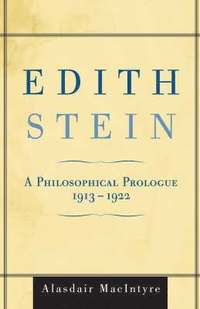
- Format
- Häftad (Paperback)
- Språk
- Engelska
- Antal sidor
- 208
- Utgivningsdatum
- 2007-05-01
- Förlag
- Rowman & Littlefield Publishers
- Illustrationer
- Black & white illustrations
- Dimensioner
- 156 x 226 x 15 mm
- Vikt
- Antal komponenter
- 1
- Komponenter
- Paperback
- ISBN
- 9780742559530
- 318 g
Edith Stein
A Philosophical Prologue, 1913-1922
- Skickas från oss inom 3-6 vardagar.
- Fri frakt över 249 kr för privatkunder i Sverige.
Passar bra ihop
De som köpt den här boken har ofta också köpt Who's Afraid of Gender? av Judith Butler (inbunden).
Köp båda 2 för 994 krKundrecensioner
Fler böcker av Alasdair Macintyre
-
A Short History of Ethics
Alasdair Macintyre
-
Ethics in the Conflicts of Modernity
Alasdair Macintyre
-
Whose Justice? Which Rationality?
Alasdair Macintyre
-
After Virtue
Alasdair Macintyre
Recensioner i media
Among many other virtues of this study of Stein as thinker is MacIntyre's magnificent demonstration of how any philosopher must be situated in the context of where she studied, who her mentors were and the historical moment both inside and outside the academy. A bravo performance. -- Kenneth L. Woodward, Contributing Editor, Newsweek A remarkable intellectual biography that ends, rather than begins, with [Stein's] conversion. ... Edith Stein is a splendid philosophical book, whose significance over time may come to rival that of After Virtue. First Things Edith Stein requir[es] slow and careful reading... Nevertheless it opens the eyes to the interest of Stein's early work and its context within the still too obscure world of Continental philosophy. Times Literary Supplement Throughout, MacIntyre has shown the appreciation of phenomenology that could have changed the course of Anglo-American philosophy had Ryle not followed up on his early review of Heidegger. -- Robert E. Wood American Catholic Philosophical Quarterly, Winter 2010 MacIntyre gives us a meticulously researched biographical introduction... Very enriching for the reader... For anyone with a serious interest in Edith as a philosopher - or those with philosophical interests wanting to know more about early 20th-century phenomenology - then this will be required reading. Food For The Journey, July-September 2010 Alasdair MacIntyre shows how the word 'philosophical' can be said of a life as well as a doctrine. He describes the people, events, and ideas in whose company Edith Stein lived in the decade that led to her baptism in 1922, and he defines phenomenology not as a method but as a disposition to let the truth of things come to light. His study of Stein's conversion and those of Reinach (to Protestantism), Rosenzweig (to Judaism) and Lukacs (to Marxism) helps us understand the difference between reason and faith. -- Fr. Robert Sokolowski, Ph.D., professor of philosophy, Catholic University of America, Washington, D.C.
Övrig information
Alasdair MacIntyre is senior research professor of philosophy at University of Notre Dame, IN. He is the author of nine books, including the influential After Virtue, Three Rival Versions of Moral Enquiry, and A Short History of Ethics.
Innehållsförteckning
Chapter 1 Why take an interest in Edith Stein as a philosopher? Chapter 2 Stein and Reinach Chapter 3 Logical Investigations: A new starting-point in Philosophy Chapter 4 The background history: From Hume to the NeoKantians Chapter 5 The Logical Investigations: What do we learn from experience? Chapter 6 Reinach's Philosophical Work Chapter 7 Stein's progress 1913-1915 Chapter 8 1915-1916 Chapter 9 Stein on our Knowledge of Other Minds Chapter 10 1916-22: The complexity of Stein's History Chapter 11 The Political Dimension Chapter 12 Stein and Husserl Chapter 13 Stein's Conception of Individual and Community Chapter 14 What kind of story is the story so far? Chapter 15 Three Conversions Chapter 16 Stein's Conversion Chapter 17 Philosophy Deferred
Du kanske gillar
-
Knife
Salman Rushdie
Inbunden


